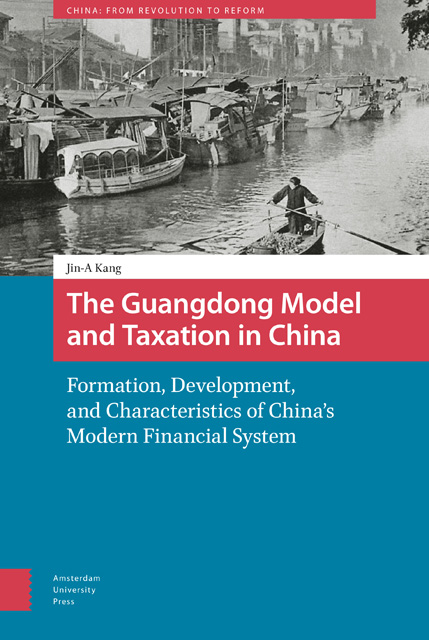 The Guangdong Model and Taxation in China
The Guangdong Model and Taxation in China Published online by Cambridge University Press: 10 January 2023
Abstract
The tax contract system reform in Guangdong province under the separatist rule in the 1930s faithfully adopted Song Ziwen's original reform program in the 1920s. But Guangdong provincial government in the 1930s attempted to systematize it more skillfully by introducing a full-scale open-bid contract. This chapter demonstrates the specific process of the tax-farming contract using five files related to the tax contractors, found among the documents of the Department of Finance, Guangdong Provincial Archives. Chapter 8 shows the vitality and merits of the tax contract system to appeal to the government and the taxpayers. For a government with weak administrative capacity, soliciting tax contractors was an attractive option to minimize tax costs and secure a fixed amount of tax revenue.
Keywords: tax-farming. Guangdong, tax contractors, Republican China
The process of tax-farming
This chapter demonstrates the specific process of the tax-farming contract using five files related to the tax contractors, found among the documents of the Department of Finance, Guangdong Provincial Archives. Table 8.1 below provides an overview of each cited file.
File No. 3 focuses on a provincial level contractor completing a oneyear contract term without a problem. The other files are all related to sub-provincial contract issues. No. 5 is a compilation of documents about the process of changing from a contract to a government agency for tax collection. File Nos. 1, 2, and 4, related to debt collection, provide many clues to understanding the operations of the contract company. These contractors were all in default on their monthly rent. The Department of Finance confiscated their securities and assets, and sometimes ordered that the company's shareholders be arrested in order to collect the debt. In the course of events, the merchants began to bargain with the authorities and requested that the government reduce rent arrears or release what had been confiscated.
The bid opening and the process of awarding a contract
Beginning in 1932, the Guangdong provincial government (hereafter, the GPG) introduced public bidding competition for all tax-farming in Guangdong. Yongchang Company of in File No. 4 won the contract for the 1933 taxation on pig exports from Hainan Island.
To save this book to your Kindle, first ensure [email protected] is added to your Approved Personal Document E-mail List under your Personal Document Settings on the Manage Your Content and Devices page of your Amazon account. Then enter the ‘name’ part of your Kindle email address below. Find out more about saving to your Kindle.
Note you can select to save to either the @free.kindle.com or @kindle.com variations. ‘@free.kindle.com’ emails are free but can only be saved to your device when it is connected to wi-fi. ‘@kindle.com’ emails can be delivered even when you are not connected to wi-fi, but note that service fees apply.
Find out more about the Kindle Personal Document Service.
To save content items to your account, please confirm that you agree to abide by our usage policies. If this is the first time you use this feature, you will be asked to authorise Cambridge Core to connect with your account. Find out more about saving content to Dropbox.
To save content items to your account, please confirm that you agree to abide by our usage policies. If this is the first time you use this feature, you will be asked to authorise Cambridge Core to connect with your account. Find out more about saving content to Google Drive.